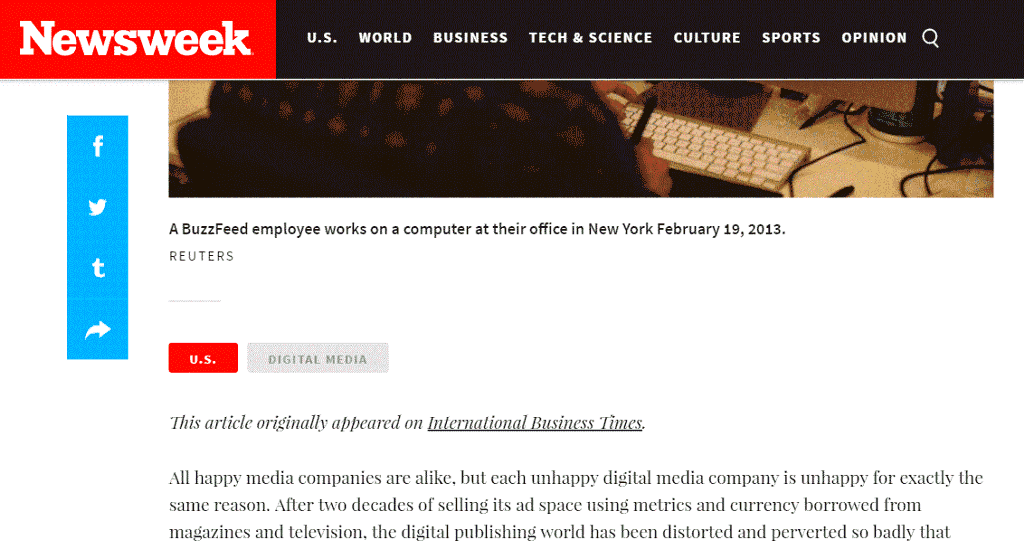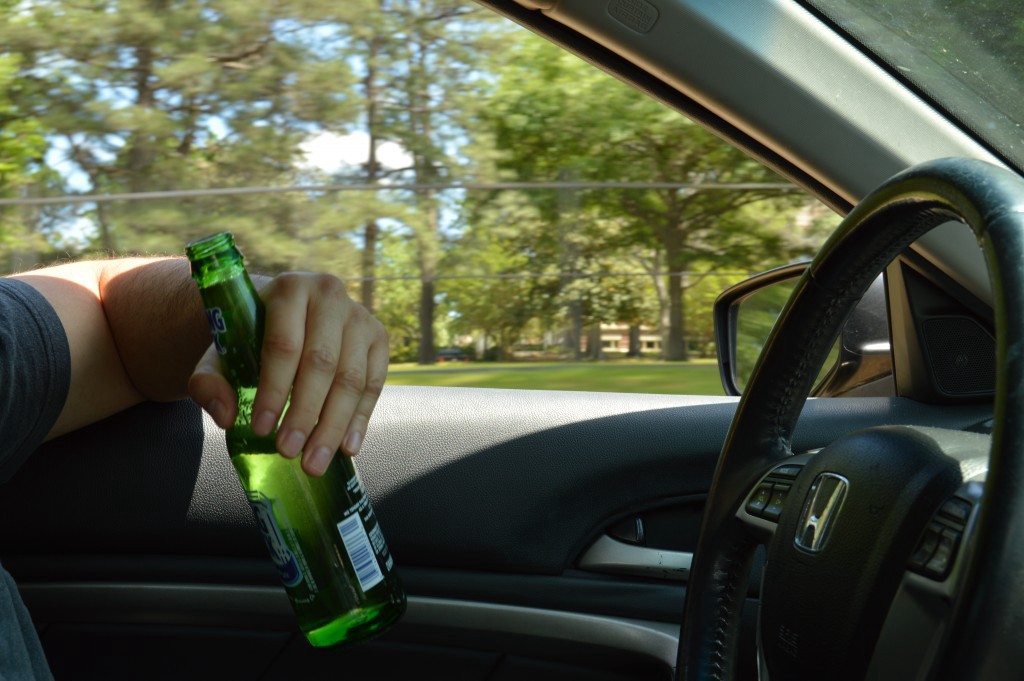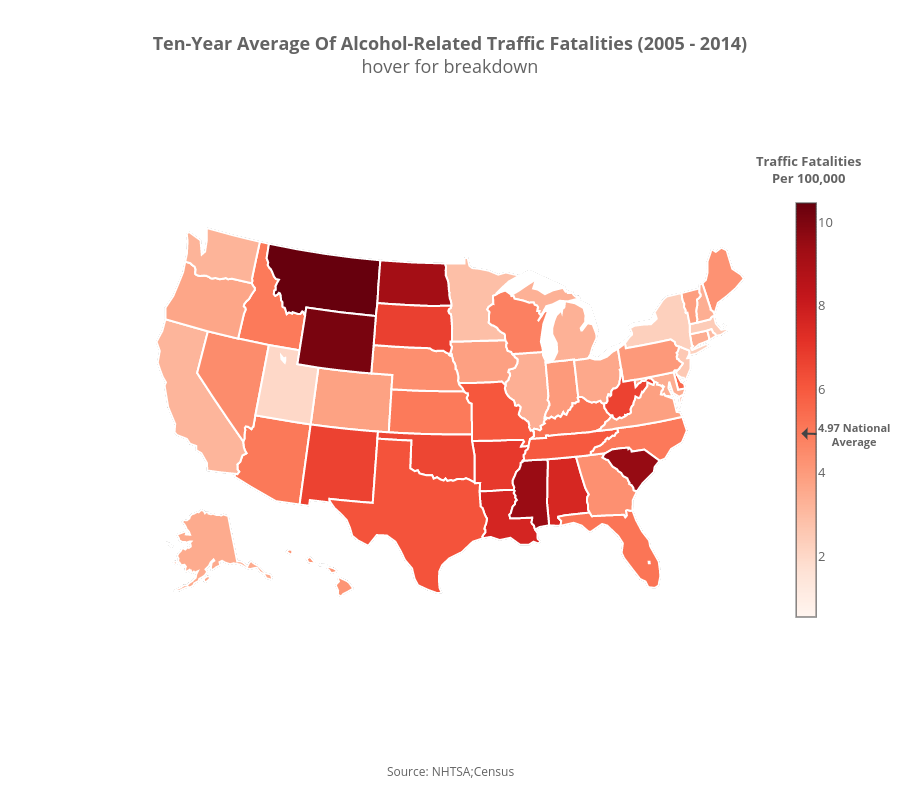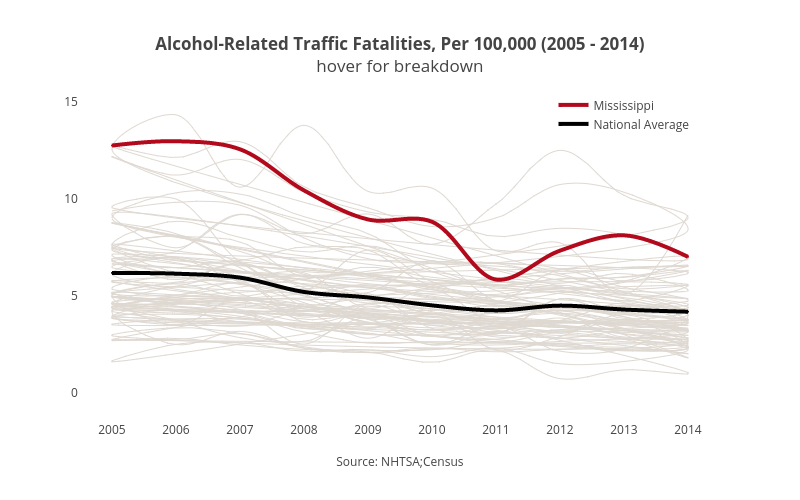It Might Be Easier To Just Figure Out What's NOT Killing Media

A Reuters photo of a BuzzFeed employee illustrates an article on Newsweek that originally appeared in International Business Times.
Is the future of journalism articles about the future of journalism?
Concentration Difficult

Now that the Internet has comprehensively eradicated our ability to maintain attention on one thing for more than a few seconds, they are telling us that “monotasking,” or what we might call “focusing,” is the skill we did you know that the reverse-chronological social media feed is dying? I didn’t even know that it was sick! But, like anything good, it has fallen victim to the profit motive of large corporations, while being assisted into the grave through the immutable law of everything getting intolerable as greater numbers of human beings interact with it. RIP, reverse-chronological social media feed. You helped kill my ability to focus and now you are yourself dead. Where was I?
Anna Meredith, "Something Helpful"
Was yesterday the longest day ever or was it just me? No matter, we’re here at Friday now! In just a few hours we’ll flip the hourglass to “weekend” and the sands within will rapidly descend until you are back at your desk Monday morning, so try not to waste the very tiny amount of time you get over the next few days by doing dumb stuff like looking at the Internet. I mean, do what you want, but take it from your pal Al, you will hate yourself a lot less if you don’t spend any of your valuable time staring into the screen of disappointment, dysfunction, and sorrow. Hey, if you have not checked out Anna Meredith’s debut album Varmints, you absolutely should. (Lead track “Nautilus” is almost four years old and is still amazing.) It’s all over the place, but in a way that only really good things are. Enjoy.
New York City, April 27, 2016

★★ The morning sky was unappealing, though here and there were unconsolidated spots of blue. Pigeons fluffed and huddled on a narrow ledge against a wall. The hoodie was too thick but the other hoodie would have been too thin. The men in suits were the ones who had probably gotten it right. The inside of the office was almost as cold as it had been in high summer. Out the windows, the clouds weakened and broke, till rush hour was cloudless. Faded phrases high on the sides of buildings brightened into legibility: CIVILIAN AND MILITARY … JAPANESE FOODS. The stagnant, still-warm air down on the subway platform was a relief.
Game Consumed

This blob is food. Food is good. Get the food. In a game about eating, you are naturally drawn to the most delicious-looking thing.
As games became more graphically advanced and complex, the rote simplicity of food-as-bonus-points evolved, impacting gameplay in more integral ways. In this new context, eating food didn’t just boost your score. Now, eating food could actually change the game in your favor, based on choices and actions made by the player.
I wasn’t ever a Sims person, but I can understand the appeal. I had a Tamagotchi once, for the week that was a thing in middle school. There’s something about puppet-stringing your way through the mundanities of someone else’s life that is both a temporary distraction from your own, and also very satisfying in a way that tying your own shoes never is. The stakes are nonexistent and all you have to gain is points, or stars, or strength.
Enter the new indie video game, “Don’t Starve.” The objective is exactly as the game states. Perversely enough, very few players live long enough to starve to death, because the game is strategically and psychologically complex — it involves not only real monsters but also hallucinations (because you’re hungry, remember). Some players have reported changes in their own real-life eating habits because of the starvation mindset the game puts you in.
Besides a thorough exploration of “Don’t Starve,” Chris Mohney from Serious Eats has provided a fantastic, thoughtful overview of food in video games through the years. You may say this game sounds like torture, but I say it is the torture our food-obsessed culture deserves. I’ll worry about civilization when someone invents “Don’t Forget To Shit.”
Photo: Flickr
Where The Goys Are
“[T]he large metros that today come closest to looking like 1950 America are Lancaster, Pennsylvania; Ogden and Provo, in Utah; and several in the Midwest and South…. Looking across all of America, including the rural areas, the regions that today look most demographically similar to 1950 America are the portion of eastern Ohio around the towns of Cambridge and Coshocton and the Cumberland Valley district in southeastern Kentucky.”
— “‘Normal America’ Is Not A Small Town Of White People”
Tweets Allowed
by Kelly McClure
email’s working
— MTV News (@MTVNews) April 28, 2016
Those of us who work on the Internet can relate to that sense of delirium that sinks in after the tedium of daily, unbroken hours spent in front of a computer screen. And then from time to time, we’ll come across a tweet from McDonald’s that just says “My balls” or something. There’s a lot of power in being able to write pretty much whatever you want and have it online within minutes, for the whole world to read! Over the past year or so there has been a lot of buzz about the amount of re-branding taking place at MTV, specifically within its news division. In an attempt to win younger audiences back from the clutches of Vice and Buzzfeed, they’ve been on a hiring spree: snatching up entertainment writers left and right. One recent acquisition is Darcie Wilder, a writer in New York who ran a Vice parody account and is known for her specific brand of stream-of-consciousness tweeting. There’s been a lot of that happening recently and it seems like Darcie is really holding on to that account password tight.
oh damn my boss is back in the office. he’s been gone this week could you tell — MTV News (@MTVNews) April 28, 2016
hi I’m reporting live from lunch with my coworkers — MTV News (@MTVNews) April 28, 2016
All of these tweets so far have gone down within the past day which leads me to believe some sort of hostage situation is taking place. MTV, if you need help air an episode of Just Say Julie within the next ten minutes so I know.
not only do i lol but i also lmao but never have i ever rofl
— MTV News (@MTVNews) April 27, 2016
i work for mtv — MTV News (@MTVNews) April 27, 2016
typos just prove how relatable we are
— MTV News (@MTVNews) April 27, 2016
Okay, that is relatable.
while i’m here i just wanna say i hate the word “hydrate” as well as the phrase “due to the fact.” just say “because” — MTV News (@MTVNews) April 27, 2016
sup. it’s me again
— MTV News (@MTVNews) April 27, 2016
forgot what i was going to say — MTV News (@MTVNews) April 26, 2016
hi I’m reporting live from lunch with my coworkers
— MTV News (@MTVNews) April 28, 2016
how do you know if you’re fired — MTV News (@MTVNews) April 26, 2016
Darcie: you’ll know when you get ejected from the company Slack. I reached out to Darcie to see how it’s going over there; I’ll update this post if I hear back!
Eric Bachmann, "Mercy"
The lyric “I’ve got friends and I’ve got family from Alaska to Miami; you won’t believe the crazy shit they sometimes say” sounds like an audition for a new National Anthem. Hell, this whole song sounds like an audition for a new National Anthem. I’m voting yes. Enjoy.
"I have not bought a record since Mazzy Star's last one."
“The winds of pop music are fickle. And guys who’ve played for me know I am disciplined, but also kind of a softie. I don’t think yelling and getting mad are ever productive. All that said, I WILL BE DIPPED IN SHIT if you try to tell me that Gotye’s ‘Someone I Used to Know’ is over. Let me tell you something: I’m not done enjoying it yet. I love it to pieces. And the guy who pulled up next to my vehicle yesterday on the way out of CVS will attest to that.”
— Awl pals Jeff Johnson and David Roth tell you what professional coaches are listening to these days.
Riding In Cars With Beers
by Owen Phillips

If you ask someone from Mississippi how long it takes to drive from Jackson, the capital, down to the Gulf Coast they might tell you “about six beers.” Walk into most gas stations there and you’ll find waist-high barrels filled with tallboys (sixteen to twenty-four ounces) and hog legs (thirty-two ounces) covered in ice. The beers are located near the door, sold individually, and placed in brown paper bags for a reason. Mississippi is the only state that doesn’t have an open-container law that prohibits drivers or passengers from drinking inside a motor vehicle. And while some counties and cities have passed their own ordinances to ban the practice, Mississippi still has an abnormally high rate of alcohol-related traffic fatalities.
In Desoto County, a beer-and-half drive from Memphis, drivers are free to keep a cold one in the cup holder. Confusingly, some cities within the county prohibit it, creating what was described by Michael Cory, a practicing attorney in Jackson, as a “hodgepodge of laws.” In 2014, Desoto County tied for the most alcohol-impaired traffic fatalities in the state. “From a public safety standpoint, I can’t think of a single good reason for it [prohibiting open containers in motor vehicles] not to be state law,” Cory said.
Lieutenant Gary Ricks, a police officer with Desoto County since 1998, explained that some drivers like to have a beer on the way home from work. Drivers who partake must maintain a blood alcohol content (BAC) below the .08 legal limit. Ricks said that officers will “most likely” administer a breathalyzer test to any driver that’s pulled over in Desoto County with an open container. “But if they check out all right, we let them go,” said Ricks.
Keith Brown, a school resource officer (essentially a cop assigned to a school) just outside of Jackson, said you couldn’t pay him to “drink a wine cooler while driving.” Brown explained that even without an open-container law, officers can deduce when a driver doesn’t belong on the road. “If there is anything out of the norm that raises suspicion, even just a twinkle in [the driver’s] eye, then you as an officer are required to investigate,” he said, noting that a driver with a beer in hand would qualify as suspicious. Still, Brown conceded that passengers are free to obliterate themselves inside a car. Brown said that, in cases where a passenger is already half-gone, but the driver is sober, all he can say is, “Have a good day.”

Historically, drivers in Mississippi are more likely to die in an alcohol-related crash than almost any other state. The National Highway Traffic Safety Administration (NHTSA) has measured traffic fatalities, both alcohol-related and not, since 1994. (“Alcohol-related” is defined by the NHTSA as at least one driver in the crash having had a BAC of at least .01.) The map below shows the ten-year average of alcohol-related traffic fatalities per 100,000 residents for each state. From 2005 to 2014, Mississippi had an average of 9.4 alcohol-related traffic fatalities per 100,000 residents each year — almost twice the national average of 4.97.

In 2014, two hundred and seven people died in alcohol-related crashes in Mississippi. With a population just shy of three million, the state had the fourth-highest rate of alcohol-related traffic fatalities that year, trailing only North Dakota, Montana, and Wyoming. (The latter two adopted their own open-container laws in 2005 and 2007, respectively.) From 2005 to 2007, the annual rates of alcohol-related traffic fatalities inMississippi were three of the worst this century.

But Mississippi’s rate of alcohol-related traffic fatalities is on the decline. As the travel writer Richard Grant remarked after living in the Mississippi Delta for his book, Dispatches From Pluto, “Things have come a long way in Mississippi, but nowhere else in America had so far to go.”

Those opposed to a statewide ban on open containers in vehicles have argued that it could exacerbate Mississippi’s impaired-driving problem, saying the ban would only encourage more drivers to stop at the bar before getting behind the wheel. At least with road sodas, or so the argument goes, a driver has some lead time before they start to feel the beverage’s effects.
“It’s a cultural thing for some of these communities,” said Eric Strickland, the Director of Federal Relations at the Governors Highway Safety Association — a nonprofit in Washington D.C. that represents state highway safety offices across the country. Strickland explained that states also face financial penalties that reverberate beyond the high rate of preventable deaths when they don’t adopt an open-container law. Mississippi loses $5 million in federal funding for highway infrastructure projects for each year it doesn’t have a statewide open-container law that meets federal standards. Instead, that money is diverted into driver-safety programs. The federal government successfully used this same tactic in the past to encourage states to adopt other common-sense standards, like the minimum drinking age of twenty-one and the BAC legal limit of .08.
If there’s any state where an additional $5 million could make a difference, it’s Mississippi, where the Department of Transportation classifies more than half the roads as either “poor” or “mediocre,” and more than a fifth of the bridges as “structurally deficient” or “functionally obsolete.” Earlier this month, the Clarion-Ledger reported that state lawmakers wrung their hands and failed to act when the chamber of commerce pleaded with legislators to raise taxes to fund the repair of the state’s crumbling roads and bridges.
It’s remarkable that Mississippi, which is largely conservative, doesn’t already have an open-container law. This is the same state that banned any beer stronger than a Sierra Nevada up until 2012. It’s also the same state where the sale of alcohol is prohibited in over a third its counties, and where some stores, until recently, sold their beer warm to discourage binge drinking. This year, Republicans held an across-the-board supermajority in both the state House and Senate. The one piece of legislation that aimed to prohibit the possession of an open alcoholic beverage in motor vehicles was sponsored by a Democrat; the bill never made it out of committee.
Photo: Juan Fernandez
